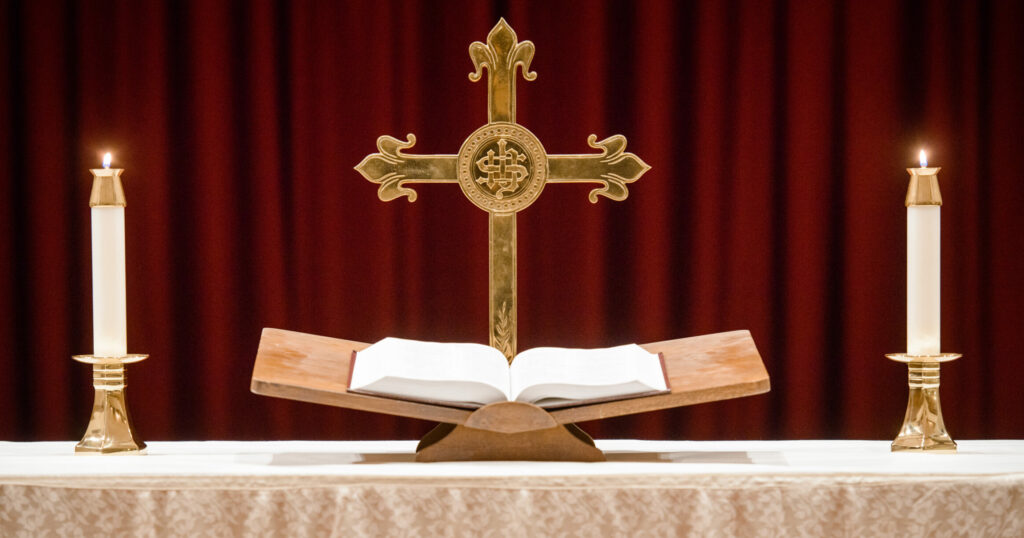Gathered around the Word
Welcome to worship, where things look and sound different from much of what you experience in your everyday life. You will use some difficult-to-pronounce words, and parts of the service will have unique names. Sometimes you’ll need the hymnal; sometimes you’ll need the bulletin.
First, don’t worry. You’re new to this, and it’s going to take some time to get used to it. Some of the people you’re sitting (or standing) next to have done this for 80 or more years. Others had to learn the service just like you. Be patient. Come back next Sunday. You won’t figure it all out the first time.
Second, ask questions. This issue of The Lutheran Witness is all about hospitality, all about welcoming you into the life of the church’s worship, where you receive from God’s hand. The people of the congregation will help you learn, and the pastor will delight to take you through the congregation’s service and open for you the treasures Christ gives in the Divine Service.
Before we dig into the details, let’s start with the big picture: Why?
The primary movement of worship is from God to us. We do not gather to do something for God. We don’t worship to stroke God’s ego or as slaves obligated to show up for an oppressive overlord.
It’s quite the opposite. Our God knows the depth of our sin, the deadening reality of our transgressions. He endured this sin on the cross. When we gather in worship around His Word, He serves us with His forgiveness. Worship is the place heaven touches earth and God delivers to us forgiveness that renews and strengthens our faith.
In the Divine Service, God serves us by speaking to us His Word. Wherever Christians gather, God’s Word is at the center and gathering point. By that Word, God speaks to us; in the service, He enfleshes His Word in His own body and blood. The heart of the Divine Service is the Word of God.
To reflect this, the service is split in two parts (along with a short preparation). The first part is the Service of the Word; the second is the Service of the Sacrament. Both services grow out of God’s speaking to us. In the first, God speaks to us from the Bible. In the second, God puts His Word into physical elements (bread and wine) and places that Word into the mouths of His people.
In the Confession and Absolution, we confess our unworthiness to stand in God’s presence. He forgives our sins and welcomes us into His presence.
In the Service of the Word, we first hear from the prophets who foretold of Christ’s coming, looking for the fulfillment of God’s promise to save the world (Gen. 3:15). Then we tune our ears to the apostles and their epistles (letters) teaching the Gospel to the Early Church. Finally, we see the full picture of God’s work in the world through the Gospel reading: the teachings and life of Jesus.
After the readings, we speak together with all Christians the words of the Nicene Creed. Then the pastor preaches on the texts, applying them to this particular congregation. He proclaims to God’s people that, though they are sinful, God has made them His own in the blood of Christ.
After we respond in thanksgiving (offering) and prayer, we turn to receive God’s Word in the Service of the Sacrament. In the Lord’s Supper, God comes to us in a way He is not present anywhere else. Heaven touches earth in this gift. Jesus — true God and true man — gives His body for us to eat and His blood for us to drink. What a profound mystery.
We testify to this in song and acclamation, fixing our attention on His gifts (Prefaces), joining in eternity’s song (Sanctus) and proclaiming His sacrificial death (Agnus Dei) until He comes. The Lord’s Supper is the most intimate expression of Christian unity, one in which only those who have been instructed, examined and absolved in a shared confession participate. In time, we pray you also will join us in this faith at His altar.
The service ends in the way it began: in His name, which sends us out in love for our neighbor. The entire service revolves around God giving to us His Word. This Word builds, strengthens and renews faith. Having received it, we go forth with it into the world, living and serving with sacrificial love.

This article originally appeared in the January 2024 issue of The Lutheran Witness.



